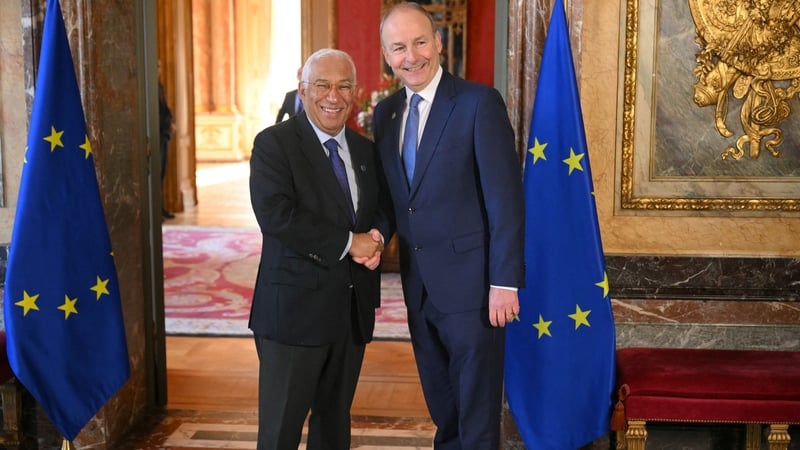The Taoiseach has said Ireland is “not opposed” to giving the European Investment Bank (EIB) the flexibility to finance defence spending.
The idea was tabled in a letter by 19 EU leaders ahead of today’s informal summit in Brussels. The Taoiseach did not add his name to the letter.
Asked if Ireland opposed the idea, Micheál Martin said: “We’re not opposed to it. These issues need to be examined in some considerable detail, because obviously, the EIB finances a lot of very worthy projects, and we want that to continue.
“There will be factors, in terms of the broadening of the EIB mandate, what that means in terms of the structure of the bank and so on.”
He also said Ireland would not stand in the way of other member states wanting to strengthen their defence and security.
The Taoiseach also hinted that Ireland could – in the future – support joint borrowing at EU level to support the defence industry.
The idea is one of several key proposals which EU leaders are discussing today, although there remain strong differences between member states about joint debt issuance for defence spending.
He alluded to the joint EU borrowing that followed the Covid pandemic as an example that Ireland supported.
“In principle, we’re open to different types of proposals that would emerge, but I think that’s some distance down the road, and other countries have big strong views on that as well.”
Mr Martin said: “It’s early days yet. What we would be anxious [to do] is to protect expenditure, for example, on issues like food security, agriculture, food production, investment in research and the [EU] Horizon programmes.
“There’s a lot of valuable expenditure already in the context of the [EU seven year budget cycle]. These are very substantive issues that remain to be resolved and [there are] significant timelines to that.
“In other words, that’s not something that will emerge today. It will be some time before those issues are clarified or sorted.”
‘Existential’ issues
The Taoiseach told reporters that defence and security were now “existential” issues for the European Union, given Russia’s aggression in Ukraine.
He said Ireland supported cooperation on maritime security, undersea cables and cyber security, in particular through the EU’s PESCO process, which facilitates cooperation on defence innovation by member states.
He said Ireland had to acknowledge that the EU could not continue as it has done in terms of defence and security.
Mr Martin said: “The European Union has to make sure that there’s an enhanced cooperation, a sharing of knowledge and experience and creating capacities within the European Union as a whole that enable people to make sure they can defend themselves.”
He added: “Defence and security will be a member state competence, and will continue to be, but Ireland will not stand in the way of other countries or facilitating other countries in terms of building up their security measures.”
Mr Martin denied Ireland was now an “awkward member” of the EU on defence and security.
“We don’t see ourselves as an awkward member,” he said.
“We have to acknowledge the realities in the world today, and the reality is that Russia violated the sovereignty and territorial integrity of Ukraine.
“”That has created an existential threat for many countries in the Baltics and indeed further afield, in terms of their own territorial integrity and sovereignty.
“We have to be realistic and acknowledge where countries like Estonia, Latvia, Poland and others are coming from, and Lithuania: they feel under real threat, and sometimes we may not appreciate that.”




